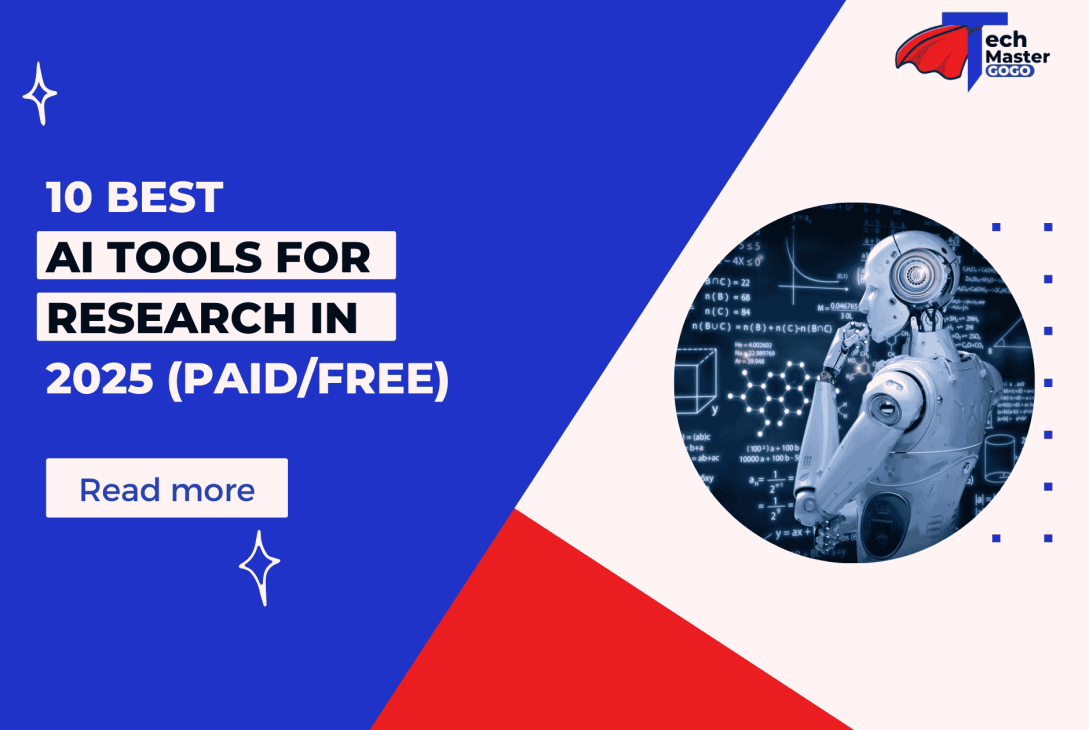10 best AI tools for research in 2025. These AI tools for researchers are designed to simplify and speed up various aspects of academic work, from conducting literature reviews to analyzing citations, organizing references, and summarizing dense research papers. With AI’s rapid advancements, these tools can assist in producing accurate and efficient results in a fraction of the time.
1. Consensus
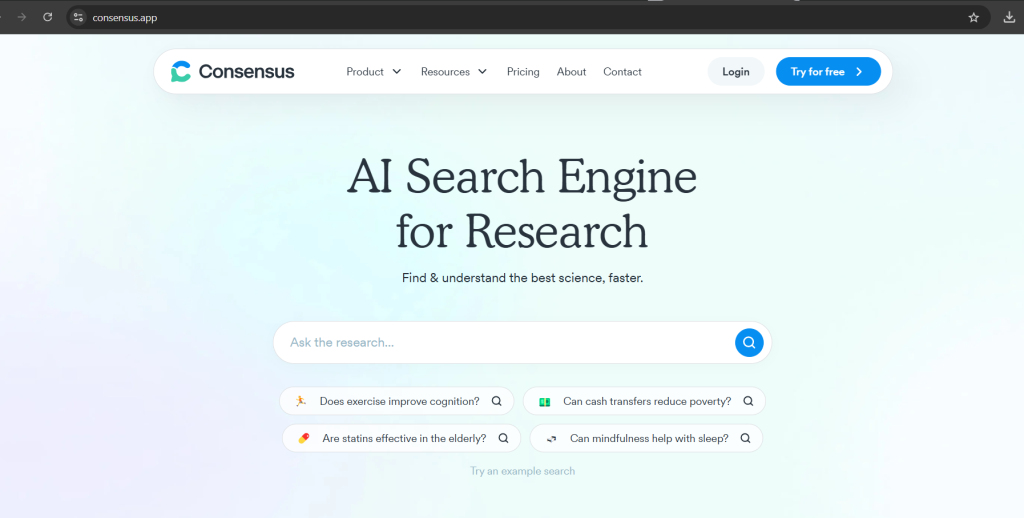
Best AI Tool for Quickly Synthesizing Research Findings
Consensus is an AI-powered research tool that helps users quickly synthesize findings from peer-reviewed sources. As one of the best AI tools for research, Consensus allows researchers to enter questions or keywords, and the tool scans scientific databases to deliver summarized insights directly from studies, making it easier to understand the consensus within scientific literature.
- Features: Summarizes scientific findings, provides fast access to main conclusions.
- Pros: Saves time with fast summaries, ideal for initial research stages.
- Cons: Limited to specific fields and peer-reviewed sources.
- Pricing: Free version available; premium starts at $8.99/month.
2. Scite
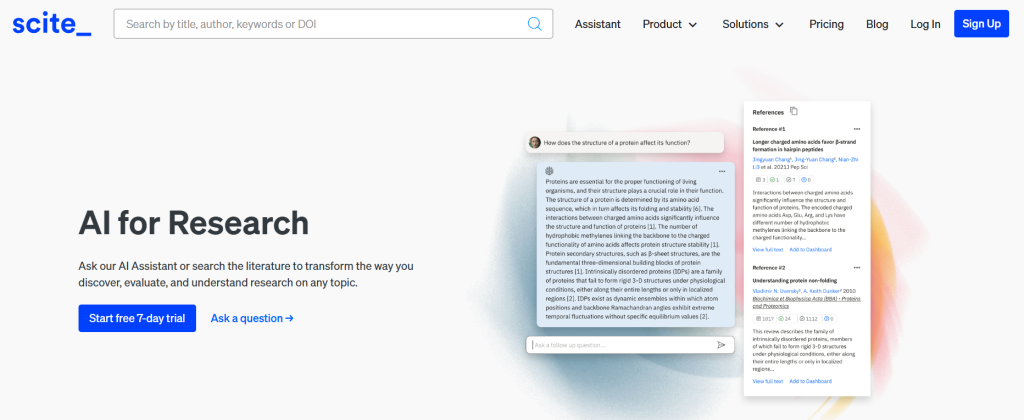
Best AI Tool for Citation Analysis and Verification
Scite is a unique AI tool for researchers that analyzes and categorizes citations to help researchers understand the context of references. Scite classifies citations as supporting, contrasting, or mentioning, allowing users to verify the reliability and relevance of cited sources, which is critical for building well-supported academic arguments.
- Features: Citation categorization (supporting, contrasting, mentioning).
- Pros: Detailed citation context, assists with credible sourcing.
- Cons: Limited to academic databases; may lack full-text access.
- Pricing: Free version with limited access; premium plans available.
3. Elicit
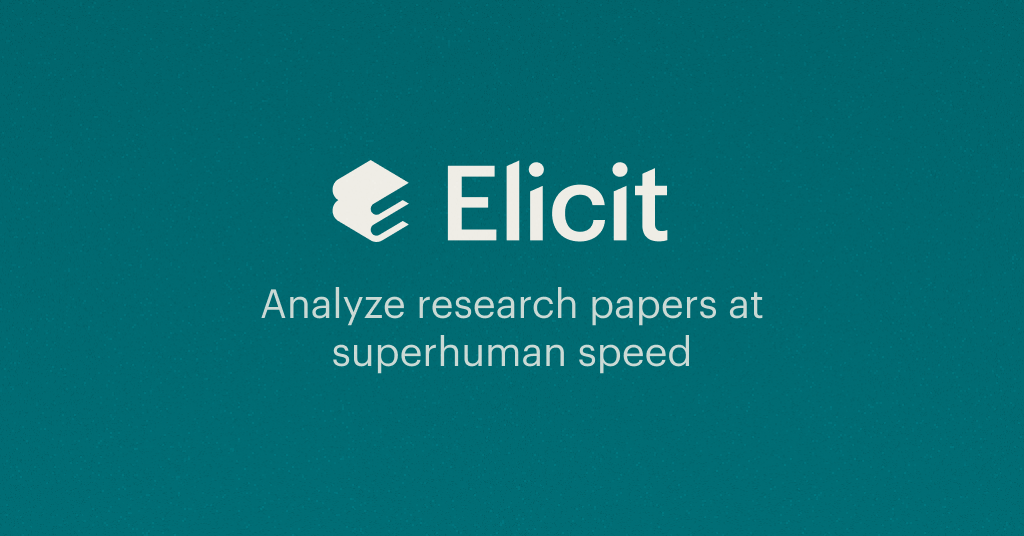
Best AI Tool for Automating Literature Reviews
Elicit is designed for automating literature reviews and summarizing large collections of academic articles. This AI tool for research uses machine learning to find, filter, and summarize relevant studies based on user-defined questions, eliminating the need for keyword-based searches. This can streamline the research process, especially in interdisciplinary studies where researchers might need to process large volumes of data.
- Features: Automated article retrieval, intelligent summarization, filtering.
- Pros: Automates the literature review process, excellent for summarizing findings.
- Cons: Limited to academic sources, may not work as well for general topics.
- Pricing: Free tier available; premium starts at $10/month.
4. ResearchRabbit
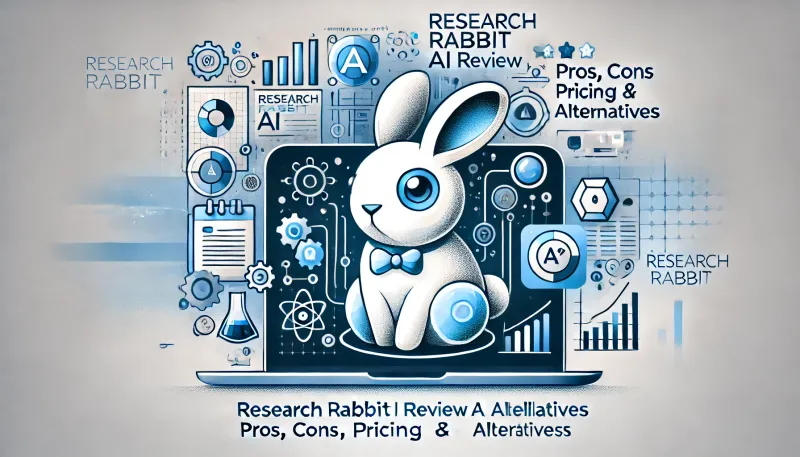
Best AI Tool for Visualizing Research Connections
ResearchRabbit is a visual-based AI research tool that allows users to map relationships between academic papers, topics, and authors, making it the “Spotify of research.” This tool offers personalized recommendations, helping users follow research trends, track influential studies, and explore interconnected research topics visually.
- Features: Visual mapping of academic networks, personalized recommendations.
- Pros: Engaging visual exploration, allows tracking of influential research.
- Cons: Limited to academic literature, may not be suitable for niche topics.
- Pricing: Free.
5. Connected Papers
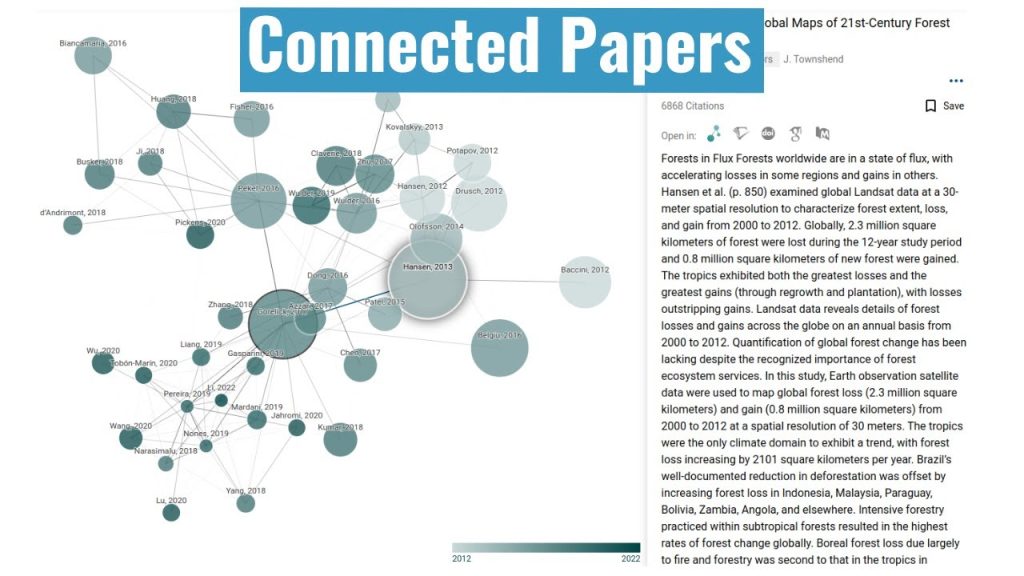
Best AI Tool for Mapping Research Landscapes
Connected Papers is a powerful AI tool for researchers looking to explore academic fields through visual mapping. By entering a single paper or topic, researchers receive a map of related studies based on shared citations, helping them discover foundational and emerging research in specific areas. It’s particularly useful for identifying key literature in new fields.
- Features: Visual map of related research papers, citation-based connections.
- Pros: Easy-to-use visual layout, ideal for exploring foundational studies.
- Cons: Limited in-depth analysis, best used as an exploratory tool.
- Pricing: Free.
6. Semantic Scholar
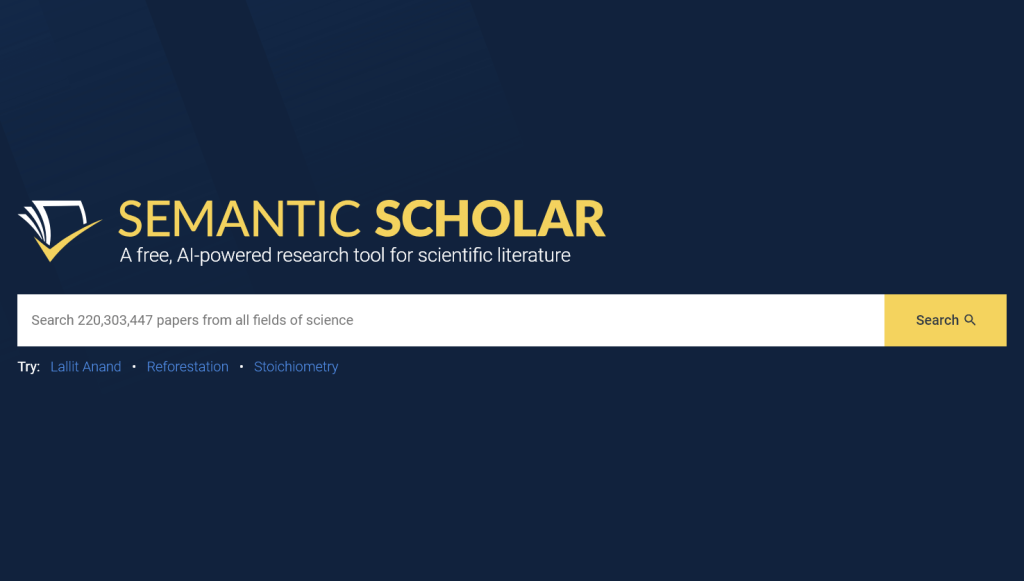
Best AI Tool for Discovering Relevant Academic Papers
Semantic Scholar is a search engine powered by AI, designed to help researchers quickly find relevant academic papers across disciplines. It offers AI-enhanced filtering and highlights essential points within articles, making it easier for researchers to focus on the most relevant studies for their literature reviews.
- Features: AI-enhanced filtering, highlights important content.
- Pros: Comprehensive academic database, accurate search results.
- Cons: Limited field coverage; some paywall restrictions.
- Pricing: Free.
7. SciSpace (Typeset)
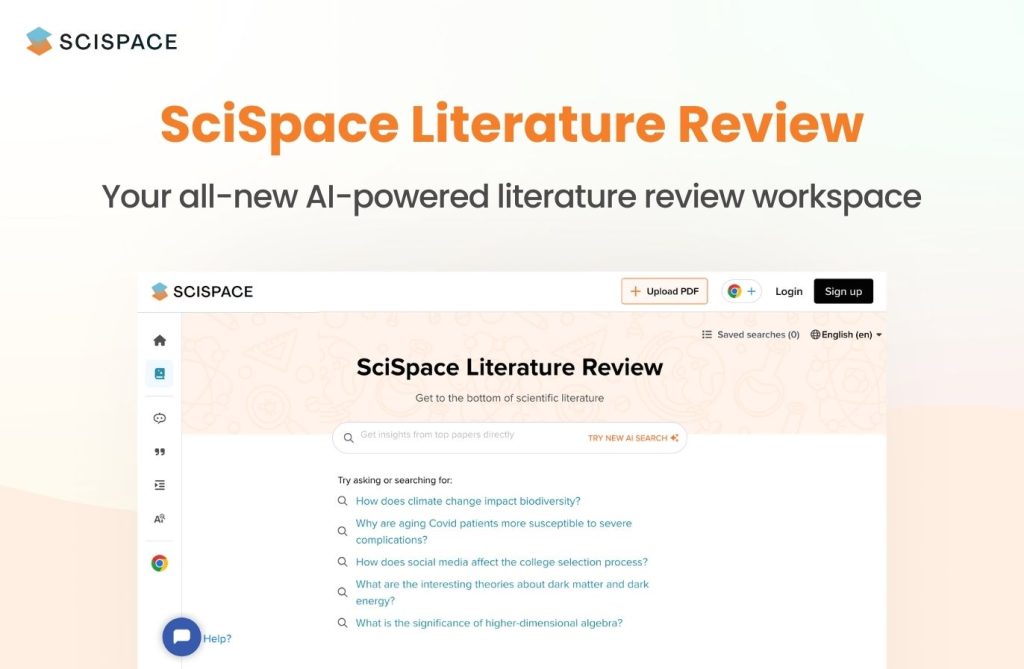
Best AI Tool for Academic Formatting and Manuscript Preparation
SciSpace (previously Typeset) is a versatile AI research tool that simplifies academic writing and publishing. With templates for journal submissions, plagiarism checks, and automatic formatting, SciSpace helps researchers prepare documents for publication, making it one of the best AI tools for researchers focused on document preparation.
- Features: Predefined templates, plagiarism check, citation management.
- Pros: Streamlines manuscript preparation, reduces formatting time.
- Cons: Some advanced features require a premium subscription.
- Pricing: Free basic version; premium options from $6/month.
8. Perplexity AI
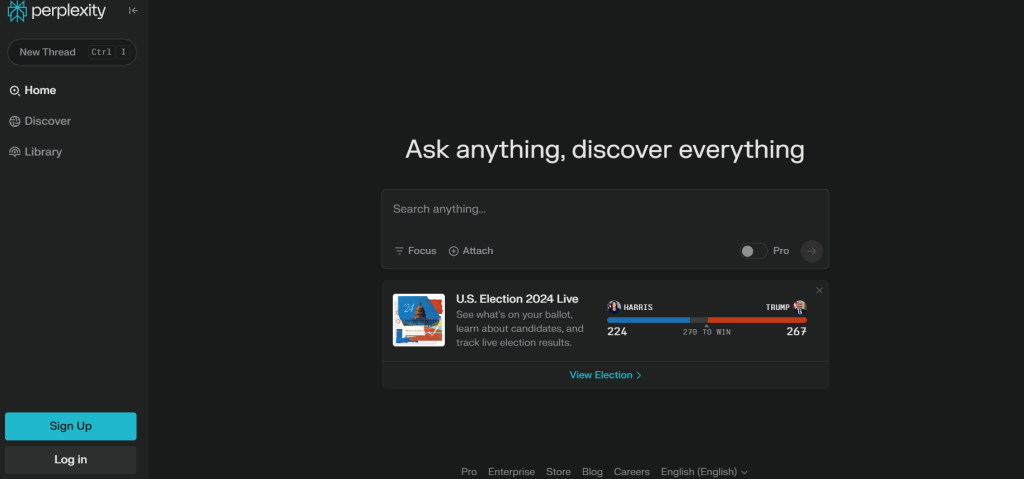
Best AI Tool for Aggregating Information from Diverse Sources
Perplexity AI is a broad-spectrum research tool that combines insights from multiple credible sources, including academic databases, Reddit, YouTube, and WolframAlpha. This AI tool for research is especially useful for compiling interdisciplinary perspectives or understanding a topic through various sources beyond traditional academia.
- Features: Source-specific insights, related questions.
- Pros: Pulls from multiple sources, good for multi-disciplinary research.
- Cons: Limited PDF integration capabilities.
- Pricing: Free.
9. ChatPDF
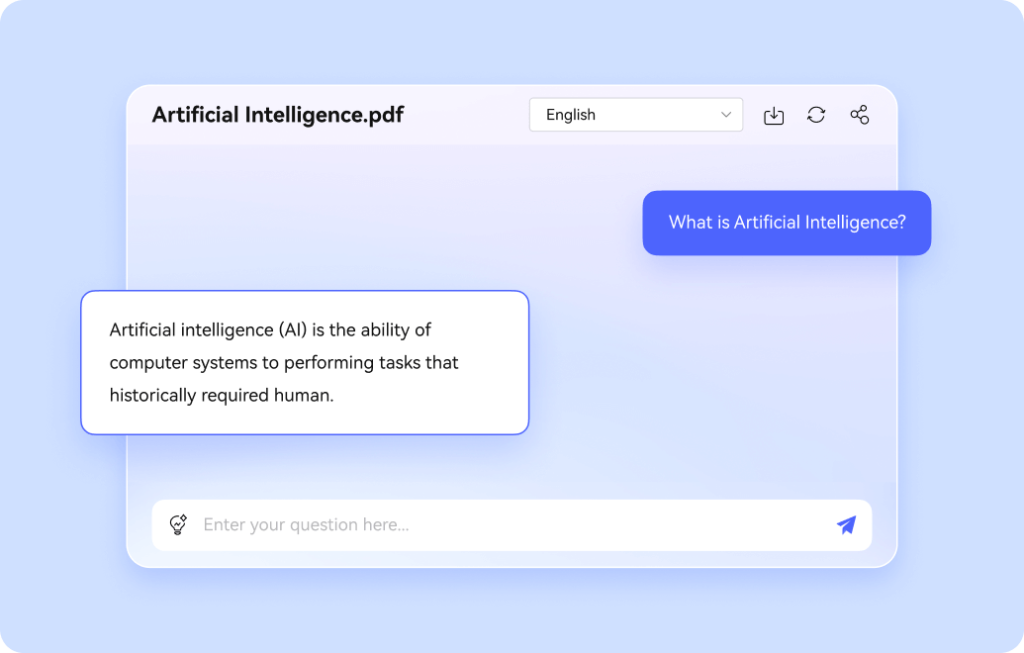
Best AI Tool for Interacting with Academic PDFs
ChatPDF allows researchers to upload PDFs and interact with them by asking questions, obtaining summaries, and extracting key points. This AI research tool is valuable for researchers handling dense academic articles, as it simplifies comprehension and speeds up the reading process.
- Features: Interactive Q&A with PDFs, summarization capabilities.
- Pros: Eases the understanding of complex papers; ideal for detailed document analysis.
- Cons: Limited to PDFs; premium subscription needed for full functionality.
- Pricing: Free with limited features; premium plans available.
10. Iris.ai
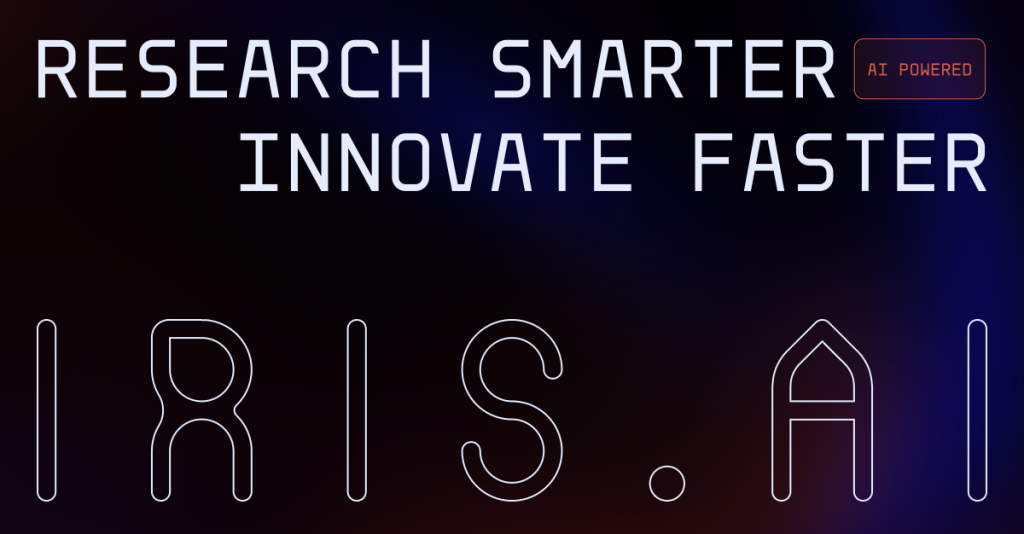
Best AI Tool for Broad and Interdisciplinary Literature Discovery
Iris.ai is an AI tool for research that enables content-based literature discovery without relying solely on keywords. Its natural language processing capabilities make it ideal for finding broad, interdisciplinary insights within large academic databases, especially useful for researchers exploring topics outside specific academic boundaries.
- Features: Content-based search, natural language processing.
- Pros: Effective for interdisciplinary research, not reliant on keywords.
- Cons: Primarily suited for technical and scientific domains.
- Pricing: Free with limited features; paid plans available.
Comparison Table
| AI Tool | Best For | Free Option | Key Features | Starting Price |
| Consensus | Summarizing research insights | Yes | Extracts conclusions from scientific research | $8.99/month |
| Scite | Analyzing and verifying citations | Yes | Categorizes citations by support, mention, or contrast | Free with premium options |
| Elicit | Literature reviews and research automation | Yes | Finds and summarizes relevant literature | $10/month |
| ResearchRabbit | Visual exploration of research papers | Yes | Graphs research networks and offers recommendations | Free |
| Connected Papers | Mapping research landscapes | Yes | Visual connections between related papers | Free |
| Semantic Scholar | Discovering relevant academic publications | Yes | AI-enhanced filters and highlights | Free |
| SciSpace | Reading and formatting research papers | Freemium | Templates for publication, plagiarism check | $6/month |
| Perplexity AI | Aggregating information from various sources | Yes | Source-specific insights, related questions | Free |
| ChatPDF | Interactive PDF summaries and Q&A | Yes | Interacts with PDFs to answer questions | Free with premium options |
| Iris.ai | Literature discovery and synthesis | Yes | Content-based search and NLP | Free with premium options |
FAQs
1. Which AI tool is best for literature review?
For literature reviews, Elicit and ResearchRabbit are great choices. Elicit automates literature discovery and provides article summaries, making it ideal for synthesizing information quickly. ResearchRabbit offers visual mapping and topic recommendations, helping researchers see connections between studies.
2. What is the best AI tool for citation analysis?
Scite stands out for citation analysis. It categorizes citations as supporting, contrasting, or mentioning, helping users assess the context and relevance of sources for reliable academic work.
3. Are there AI tools for summarizing PDFs?
Yes, ChatPDF is designed to interact with PDFs, summarizing and answering questions on document content. Consensus also provides summaries by parsing main points from research studies, enhancing comprehension of complex research papers.
4. What AI tool can help discover new research areas?
Connected Papers and Iris.ai are ideal for discovering new fields. Connected Papers provides a visual map of related research, while Iris.ai allows content-based discovery across multiple disciplines,I hope this guide on 10 best AI tools for research has provided clarity on the functionalities, ideal use cases, and key features of these tools. Each of these AI research tools offers unique capabilities, such as visual exploration, summarization, citation analysis, and interdisciplinary literature discovery, streamlining various research processes. Whether you’re conducting literature reviews, analyzing citations, or organizing academic PDFs, these tools are designed to make research more efficient and manageable.


